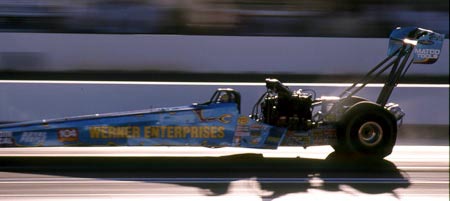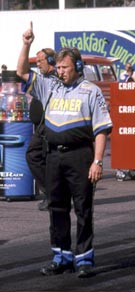|
Mike Kloeber's
Juggling Act is Over
By Chris Martin
Photos by Jeff Burk
3/7/03

For this story I wrote the headline: IHRA TOP
FUEL CHAMP TUNER TURNS HIS SIGHTS TO NHRA GLORY
AFTER 'JUGGLING' HIS WAY THROUGH 2002.
I know it's not the greatest of headlines,
but at a real newspaper the writer never writes
the heads; the copy desk does. But what Mike
Kloeber did last year by tuning his driver Clay
Millican and the Peter Lehman-owned Werner Enterprises
Top Fuel dragster to the IHRA title and threatening
on the NHRA side doesn't lend itself to a quickie
blurb.
Okay, excuses exorcised. To the heart of darkness,
okay?
I thought the most interesting Top Fuel occurrence
of last year was not Larry Dixon winning the
NHRA bauble, but rather Clay Millican's rattling
off ten straight IHRA Top Fuel event wins and
eventually winning 11 of the association's 12-event
schedule. While it's true that Paul Romine,
Bruce Litton, Jim Head, Jack Ostrander (the
only guy to beat Millican all year) and Roger
Dean are not on a par with the NHRA contenders,
they nonetheless are capable of pulling an upset
and running respectably.
Not only that, but by and large, IHRA tracks
are not quite what the NHRA arenas are in terms
of traction. Your ability to get traction and
make power consistently is sorely tested at
one of these emporiums.
What Kloeber did was even more amazing in that
he also ran seven NHRA national events last
year and qualified at six, putting his driver
in the semifinals on two occasions and failing
to qualify only once. What's more, his wrenching
abilities had produced a by-2002 best of 4.55
at 322.73.
That alone would qualify as a serious contender
for any personal Top Fuel team of the year honors,
but what really made it all click for me is
that Kloeber pulled this off while running two
different tune-ups, one for NHRA, one for IHRA.
 "If
there's one development for 2003 that make me,
Clay, and Roger happy, it's that the rules are
the same now," Kloeber said. "What we run at
NHRA is what we will run at IHRA. There are
plenty of tuners who have the ability to run
both of these set-ups, but it was a challenge
for us last year to go back and forth from one
to the other. "If
there's one development for 2003 that make me,
Clay, and Roger happy, it's that the rules are
the same now," Kloeber said. "What we run at
NHRA is what we will run at IHRA. There are
plenty of tuners who have the ability to run
both of these set-ups, but it was a challenge
for us last year to go back and forth from one
to the other.
"IHRA's cars in 2002 weighed 75-pounds more
and made you run 25-percent over on the blower
and that limits what it can produce as airflow.
In NHRA racing, there was no limit on the blower
drive. If nothing else, IHRA made it tougher
on you if you oiled the track. You actually
could lose 20 points if you had one horrible
run. They take away 15 points for an oil-down
and you get five points for a clean qualifier.
So if you went out and killed the engine and
shut off early, that could hurt. What that all
meant is that you had to be careful. We ran
a ton of 4.60s, but to go after a 4.50 at an
IHRA race with their rules meant running the
car on the ragged edge. It just didn't make
any sense to do that. Why not settle for consistency,
do it with runs that wouldn't tear up the equipment,
and win some races? I knew we could run them
and we did at NHRA races.
NEXT
PAGE >>
|